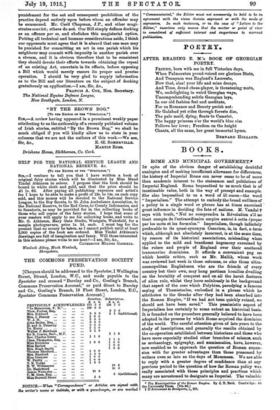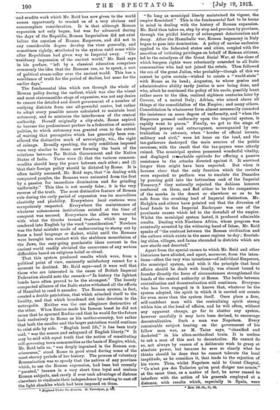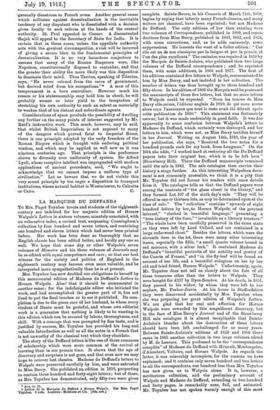BOOKS.
ROME AND MUNICIPAL GOVERNMENT.*
IN spite of the obvious danger of establishing doubtful analogies and of making insufficient allowance for differences, the history of Imperial Rome can never cease to be of 11101'0 than academic interest to the statesmen and politicians of Imperial England. Rome bequeathed to us much that is of inestimable value, both in the way of precept and example. She also bequeathed to us a word of ill omen—the word " Imperialism." The attempt to embody the broad outlines of a policy in a single word or phrase has at times exercised great influence in deciding the fate of nations. M. Vandal t says with truth, " Nul ne comprendra. la Revolution s'il ne tient compte de l'extraordinaire empire exerce a cette époque par lee mots et lee formules." Imperialism, though infinitely preferable to its quasi-synonym Cesarism, is, in fact, a term which, although not absolutely incorrect, is at the same time, by reason of its historical associations, misleading when applied to the mild and beneficent hegemony exercised by the rulers and people of England over their scattered transmarine dominions. It affords a convenient peg on which hostile critics, such as Mr. Mallik, whose work was reviewed last week in these columns, as also those ultra- cosmopolitan Englishmen who are the friends of every country but their own, may hang partisan homilies dwelling on the brutality of conquest and on all the harsh features of alien rule, whilst they leave sedulously in the background that aspect of the case which Polybius, parodying a famous saying of Themistocles, embodied in a phrase which he attributes to the Greeks after they bad been absorbed into the Roman Empire, "If we had not been quickly ruined, we should not have been saved." This pessimistic aspect of Imperialism has certainly to some extent an historical basis. It is founded on the procedure generally believed to have been adopted in the process by which Rome acquired the dominion of the world. The careful attention given of late years to the study of inscriptions, and generally the results obtained by the co-operation established between historians and those who have more especially studied other branches of science, such as archaeology, epigraphy, and numismatics, have, however, now enabled us to approach the question of Roman expan- sion with far greater advantages than those possessed by writers even so late as the days of Mommsen. We are ablo to reply with a greater degree of confidence than at any previous period to the question of how far Roman policy was really associated with those principles and practices which many are accustomed to designate as Imperial. The valuable • The Municipalities of the Roman Empire. By 4. E. Reid. Caratrldge : At
the University . [108.6d.] t "L'Avenerrient de Bonaparte, i., 217.
safe from the crushing load of Imperial distinction. Mr. elasticity and pliability. Everywhere local customs were -scrupulously respected. Everywhere the maintenance of Hodgkin and others have pointed out that the diversion of -whatever autonomous institutions existed at the time of local funds to the Imperial Exchequer was one of the -c proximate was secured. Everywhere the allies were treated causes which led to the downfall of the empire. with what the Greeks termed &game; which may be Whilst the municipal system lasted, it produced admirable results. Dealing with Northern Africa, whose progress was -rendered into English by the word "consideration." Nowhere
was the fatal mistake made of endeavouring to stamp out by eventually arrested by the withering hand of Islam, Mr. Reid speaks of "the contrast between the Roman civilization and force a local language or dialect, whilst until the Romans
the culture which exists in the same regions to-day ; flourish- were brought into contact with the stubborn monotheism of the Jews, the easy-going pantheistic ideas current in the ing cities, villages, and farms abounded in districts which are -ancient world readily obviated the occurrence of any serious now sterile and deserted," difficulties based on religious belief or ritual. Apart from the special causes to which Mr. Reid and other - That this system produced results which were, from a
historians have alluded, and apart, moreover, from the inten- -political point of view, eminently satisfactory cannot for a tions—of ten the very wise intentions—of individual Emperors, doubted. Mr. Reid says—and it were well that
moment be
the municipal system, and with it the principle that local those who are interested in the cause of British Imperial affairs should be dealt with locally, was almost bound to Federation should note the remark—" In history the lightest founder directly the force of circumstances strengthened the bonds have often proved to be the strongest." The loosely hands of the central authority at Rome. The battle between -compacted alliance of the Italic states withstood all the efforts centralization and decentralization still continues. Everyone of Hannibal to rend it asunder. The Roman system, in fact, who has been engaged in it knows that, whatever be the created a double patriotism, that which attached itself to the system adopted, the spirit in which it is carried out counts locality, and that which broadened out into devotion to the for even more than the system itself. Once place a firm, metropolis. Neither was the one allegiance destructive of self-confident man with the centralizing spirit strong the other. When Ennius made his famous boast be did not within him at the head of affairs, and he will often, without mean that he spurned Rudiae and that he would for the future any apparent change, go far to shatter any system, look exclusively to Rome as his mother-country, but rather however carefully it may have been devised, to encourage that both the smaller and the larger patriotism would continue decentralization. Such a man was Napoleon. Every to exist side by side. "English local life," it has been truly conceivable subject bearing on the government of his said, " was the source and safeguard of English liberty."* It fellow men was, as M. Taine says, "classified and may be said with equal truth that the notion of constituting docketed" in his ultra-methodical brain. It is useless self-governing town communities as the basis of Empire, which, to ask a man of this sort to decentralize. He cannot do Mr. Reid tells us, " was deeply ingrained in the Roman con- so, not always by reason of a deliberate wish to grasp at sciousness," stood Rome in good stead during some of the absolute power, but because he seas so clearly what he
done that he cannot tolerate the local most stormy periods of her history. The process of voluntary thinks should be R ineptitude, as he considers it, that leads to the rejection of omanization was so speedy that the natives of any province
which, to use the Roman expression, had been but recently his views. Thus, whilst Napoleon said to Count Chaptal, e' pacated," became in a very short time loyal and zealous " Ce n'est pas des Tuileries qu'on peut diriger une armee," Roman subjects, and rarely if ever took advantage of distress at the same time, as a matter of fact, he never ceased to .elsewhere to vindicate their independence by seeking to cast off interfere with the action of his generals in Spain,waterea
the light shackles which had been imposed on them. distance, with results which, especially
• England Under the Stuarts. G. Trevelyan, p. A • Jior. Od. hi., 11, 24,
-.and erudite work which Mr. Reid has now given to the world " So long as municipal liberty maintained its vigour, the
comes opportunely to remind us of a very obvious and empire flourished." This is the fundamental fact to be borne commonplace consideration. It is that although Roman in mind in dealing with the history of Roman expansion. -expansion not only began, but was fur advanced during Mr. Reid then takes us, step by step and province by province, the days 'of the Republic, Roman Imperialism did not exist through the pitiful history of subsequent deterioration and before the creation of Roman Emperors, and did not in decay. After the Hannibalic war, Roman hegemony in Italy any considerable degree develop the vices generally, and began to pass into domination. A policy of unwise exclusion sometimes rightly, attributed to the system until some while applied to the federated states and cities, coupled with the after Republican had given way to Imperial sway. " The assertion of irritating privileges on behalf of Roman citizens, -residuary impression of the ancient world," Mr. Reid says led to the cataclysm of the Great Social War, at the close of in his preface, " left by a classical education comprises which burgess rights were reluctantly conceded to all Italic -commonly the idea that the Romans ran, so to speak, a sort communities who had not joined the rebels. Then followed of political steam-roller over the ancient world. This has a the era of the great Julius, who probably—though of this we semblance of truth for the period of decline, but none for the cannot be quite certain—wished to create a "world-state"
earlier days." with Rome as its head; Augustus, to whose genius and
The fundamental idea which ran through the whole of administrative ability tardy justice is now being done, and Boman policy during the earliest, which was also the wisest who, albeit he continued the policy of his uncle, possibly leant and most statesmanlike stage of expansion, was not any desire rather more to the idea, realized eighteen centuries later by to ensure the detailed and direct government of a number of Cavour, of a united Italy; Adrian, who aimed above all -outlying districts from one all-powerful centre, but rather things at the consolidation of the Empire; and many others. 'to adopt every possible means calculated to maintain local Consolidation In whatsoever form almost necessarily connoted autonomy, and to minimize the interference of the central the insistence on some degree of uniformity, and " when the authority. Herself originally a city-state, Rome aspired Emperors pressed uniformity upon the imperial system, it 'to become the predominant partner in a federation of munici- rapidly went to pieces." Finally, we get to the stage of palities, to which autonomy was granted even to the extent Imperial penury and extravagance, accompanied by cen- of waiving that prerogative which has generally been con- tralization in extremis, when " hordes of official locusts, siiered the distinctive mark of sovereignty, viz., the right military and civil," were let loose on the land, and the of coinage. Broadly speaking, the only conditions imposed tax-gatherers destroyed the main sources of the public were very similar to those now forming the basis of the revenues, with the result that the tax-payers were utterly relations between file British Government and the Native ruined. The municipal system possessed wonderful vitality, States of India. These were (1)-that the various common and displayed remarkable aptitude for offering a passive wealths should keep the peace between each other ; and (2) resistance to the attacks directed against it. It survived that their foreign policy should he dictated by Rome. It is longer than might have been expected. But when it often tacitly assumed, Mr. Reid says, that "in dealing with became clear that the only function which the curialea -conquered peoples, the Romans were animated from the first were expected to perform was to emulate the Danaides .by a, passion for immediate domination and for grinding by pouring gold into the bottomless cask of the Imperial -uniformity." This idea is not merely false ; it is the very Treasury,* they naturally rejected the dubious honours reverse of the truth. The most distinctive feature of Roman conferred on them, and fled either to be the companions rule during the early period of expansion was its marvellous of the monks in the desert or elsewhere so as to be
safe from the crushing load of Imperial distinction. Mr. elasticity and pliability. Everywhere local customs were
was the fatal mistake made of endeavouring to stamp out by eventually arrested by the withering hand of Islam, Mr. Reid speaks of "the contrast between the Roman civilization and force a local language or dialect, whilst until the Romans
the culture which exists in the same regions to-day ; flourish- were brought into contact with the stubborn monotheism of
,-generally disastrous to French arms. Another general cause -which militates against decentralization is the inevitable -tendency of any disputant who is dissatisfied with a decision -given locally to seek redress at the hands of the central authority. St. Paul appealed to Caesar. A discontented Rajah will appeal to the Secretary of State for India. It is certain that in these cases, unless the appellate authority acts with the greatest circumspection, a-risk will be incurred of giving a severe blow to the fundamental principles of decentralization. It is no very hazardous conjecture to assume that many of the Roman Emperors were, like -Napoleon, constitutionally disposed to centralize, and that the greater their ability the more likely was this disposition to dominate their mind. Thus Tacitus, speaking of Tiberius, says, "He never relaxed from the cares of government, -but derived relief from his occupations."* A man of this temperament is a born centralizer. However much his reason or his statesmanship may hold him in check, he will _probably sooner or later yield to the temptation of stretching his own authority to such an extent as materially to weaken that of his distant and subordinate agents.
Considerations of space preclude the possibility of dwelling any further on the many points of interest suggested by Mr. -Reid's instructive work. This much, however, may be said, that whilst British Imperialism is not exposed to many of the dangers which proved fatal to Imperial Rome, there is one principle adopted by the early founders of the "Roman Empire which is fraught with enduring political wisdom, and which may be applied as well now as it was nineteen centuries ago. That principle is the preference shown to diversity over uniformity of system. Sir Alfred -Lyall, whose receptive intellect was impregnated with modern applications of ancient precedents, said, " We ought to acknowledge that we cannot impose a uniform type of .civilization." Let us beware that we do not violate this very sound principle by too eager a disposition to transport institutions, whose natural habitat is Westminster, to Calcutta












































 Previous page
Previous page